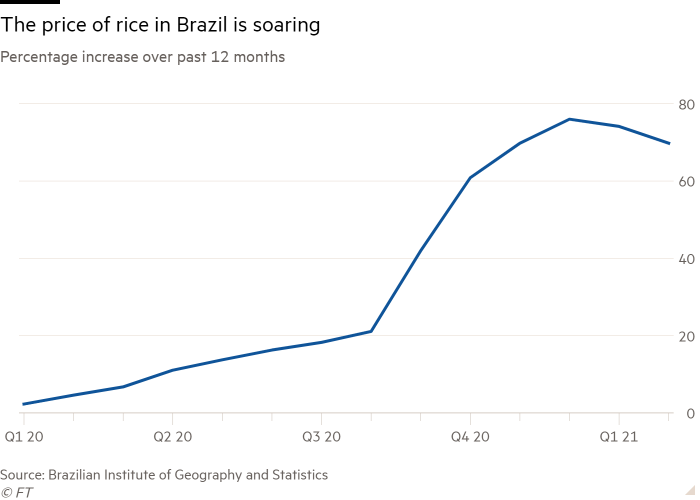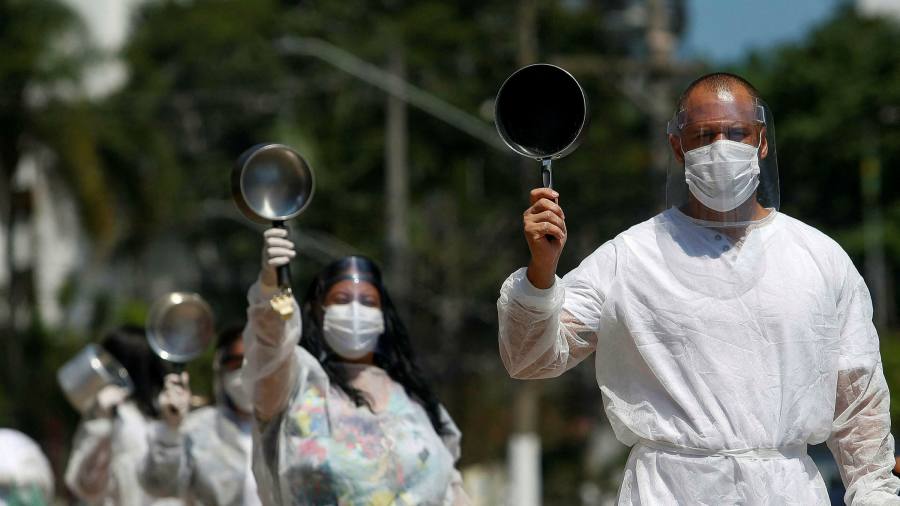[ad_1]
After seven months in lockdown, Michele Marques received some unwelcome news when she returned to work: while she was away the prices of almost all the products she uses as a hairdresser had soared.
“A box of gloves rose 200 per cent. Colouring products increased at least 100 per cent,†said the 37-year-old from São Paulo, underlining how costs were rising while her revenue had collapsed. “I had to raise the price of my services, too.â€
It is a dynamic that is playing out across Brazil, adding an extra layer of complexity to the country’s coronavirus crisis, which has already claimed the lives of almost 350,000 individuals and pushed hospital services to the brink.
With much of Latin America’s largest economy being shuttered, inflation is surging to its highest level in years, fuelling a silent scourge of hunger among poorer citizens that has run in parallel to the Covid-19 pandemic.
“The high price of staple foods — rice and beans, for example — has led to the disappearance of these items from the table of millions of Brazilians,†said Ana Maria Segall, a researcher at the Brazilian Research Network on Food and Nutritional Sovereignty and Security. In the 12 months to the end of March, the price of rice increased 64 per cent and black beans 51 per cent.
“In Brazil currently food inflation has penalised the very poorest, preventing them from having adequate access to food and in many situations leading to hunger,†she said, adding that rising unemployment and the curtailment of social programmes were also contributing factors.
Less than half of Brazil’s population of 212m now has access to adequate food all the time, with 19m people, or 9 per cent of its inhabitants, facing hunger, according to a recent report by Segall’s group.
“I’m doing some odd jobs, but it’s not enough to keep us going,†said Jonathan, a 28-year-old who lost his job in the kitchen of a Chinese restaurant in São Paulo when the pandemic began. He said he now struggles to provide enough food for his three young children and pregnant wife.
On a 12-month basis, inflation in June is expected to surpass 8 per cent, far above earlier estimates. In the 12 months to March, food prices jumped 18.5 per cent, while the price of agricultural commodities in local currency surged 55 per cent and the cost of fuel increased almost 92 per cent.

The developments pose a fresh challenge to President Jair Bolsonaro, who is already under fire for his handling of the Covid-19 pandemic. Across Brazil’s biggest cities, graffiti has sprung up labelling the populist leader “Bolsocaro†— a portmanteau of his name and the Portuguese word for expensive.
The rising prices are also likely to provide useful ammunition to leftist former president Luiz Inácio Lula da Silva, who returned to the political fray last month and may challenge Bolsonaro in elections next year.
“Bolsonaro is to blame for the increase in food prices, he is to blame for everything. They have to remove this guy,†said Maria Izabel de Jesus, a retiree from São Paulo.
Armando Castelar, a researcher at the Brazilian Institute of Economics, said the government had underestimated inflation both in terms of the numbers and also “how much a concern it should beâ€.
He attributed the rising prices to the devaluation of the Brazilian currency, triggered in part by the stimulus packages passed by the US government — which helped to bolster the dollar and led to higher Treasury yields — and the brighter economic outlook outside Latin America.
“You have a situation where commodity prices are going up because the global economy is going to grow a lot this year. With the growth in the US, interest rates are going up and the dollar is strengthening. This puts a lot of pressure on the exchange rate in Brazil and emerging markets in general,†he said.
As the spectre of inflation loomed last month, the Brazilian central bank raised its key interest rate by 75 basis points, higher than the half-percentage point many economists had expected. A further rate rise is expected next month.
“The central bank acted correctly, but it cannot stop there. It is important not to be too lenient in dealing with this,†said Castelar.
Silvia Matos, a co-ordinator at the Brazilian Economy Institute, also pointed to Brazil’s weakening currency as a contributing factor to inflation. But she said the slide in the real was triggered by investor concerns over Brazil’s deteriorating public finances.
Following the creation of two separate stimulus packages to mitigate the impact of Covid-19, government debt has risen to about 90 per cent of gross domestic product, a high level for an emerging market economy.
The rollout of the second of these packages began this month, with 45m Brazilians set to receive $50 a month for four months.
Critics said, however, these stipends were not nearly enough to keep people both fed and at home in lockdown.
“It is essential that the emergency aid is of a greater value, so that people do not leave the house but no one also stays at home starving,†said Marcelo Freixo, a federal lawmaker with the leftwing PSOL party.
“We need to reduce the circulation of the disease. Brazil is already experiencing 4,000 deaths per day. We will reach 500,000 total deaths by the middle of the year.â€
Matos says that inflation had hit poorer citizens much harder than middle-class and rich Brazilians because a larger portion of their income was dedicated to food, the price of which has increased substantially.
“The only thing that could help right now is to get out of this pandemic,†she said.
Coronavirus business update

How is coronavirus taking its toll on markets, business, and our everyday lives and workplaces? Stay briefed with our coronavirus newsletter.
[ad_2]
Source link







